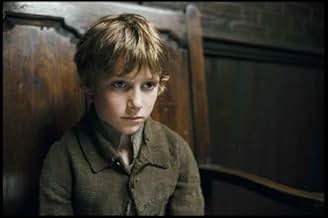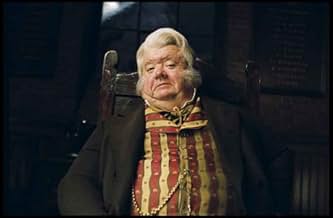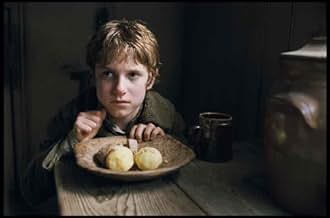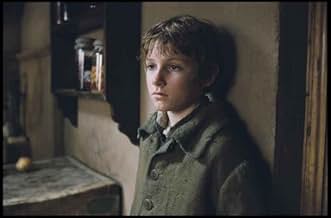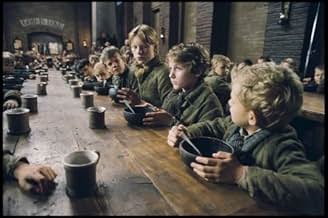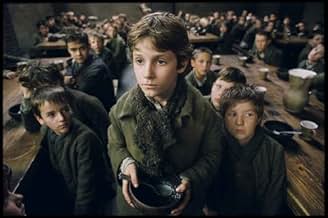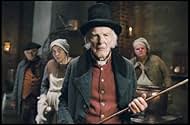An adaptation of the classic Dickens tale, where an orphan meets a pickpocket on the streets of London. From there, he joins a household of boys who are trained to steal for their master.An adaptation of the classic Dickens tale, where an orphan meets a pickpocket on the streets of London. From there, he joins a household of boys who are trained to steal for their master.An adaptation of the classic Dickens tale, where an orphan meets a pickpocket on the streets of London. From there, he joins a household of boys who are trained to steal for their master.
- Awards
- 2 wins & 4 nominations total
Joe Tremain
- Hungry Boy
- (as Joseph Tremain)
- Director
- Writers
- All cast & crew
- Production, box office & more at IMDbPro
6.835.3K
1
2
3
4
5
6
7
8
9
10
Featured reviews
Well made, a great version of a much loved tale
I was somewhat ambivalent about the thought of one of my favourite directors making a version of the much loved classic tale Oliver Twist. On the one had Roman Polanski crafts wonderful and moving films extremely well so I was intrigued to see how he would weave this one together. From his early 'Knife in the water' through to 'The Pianist' each has his trademark directorial stamp on it whilst still being truly incredible and individual films. On the other hand, the Oliver Twist tale has been screened to death both in two highly regarded films as well as multifarious TV versions over the years. In my opinion David Lean's version is fantastic, Alec Guiness superb as Fagin and the whole film experience has kept me going back from childhood through to adulthood.
So it was with great trepidation that I went to see this spanking brand new version and thankfully I was not disappointed. The character of Fagin, so crucial to the story, is performed with outstanding ability by Ben Kingsley. He really portrays this grotesque but somehow lovable character well from his slight mannerisms and movements to his vocal abilities. Also, finely performed were the parts of the artful dodger (Harry Eden), Mr Brownlowe (Edward Hardwicke) and of course Oliver Twist (Barney Clarke). There was such sadness and despair in his eyes throughout that he really captured the part well. Less convincing was Bill Sykes (Jamie Foreman) who was not right for the part nor performed well enough to stand up against the masterful Oliver Reed in a previous version. Foreman is a regular in gangster type films and for me did not really fit into the cast or film well here.
The recreation of mid 19th century London is done well with Polanski drawing on the visual inspiration of Dore prints of the period for authenticity. The cinematography is as accomplished as always in a Polanski film and the lighting helped to create dramatic moods well.
All in all a very competent and entertaining version with great acting, a fine pace and an outstanding final scene of Fagin finished and soon to face death gripping hold of Oliver tightly. I would highly recommend to adults, children and die hard fans of other versions. All great directors have different visions and Polanski has used his vision and experienced craftmanship in successfully remaking this much loved tale.
So it was with great trepidation that I went to see this spanking brand new version and thankfully I was not disappointed. The character of Fagin, so crucial to the story, is performed with outstanding ability by Ben Kingsley. He really portrays this grotesque but somehow lovable character well from his slight mannerisms and movements to his vocal abilities. Also, finely performed were the parts of the artful dodger (Harry Eden), Mr Brownlowe (Edward Hardwicke) and of course Oliver Twist (Barney Clarke). There was such sadness and despair in his eyes throughout that he really captured the part well. Less convincing was Bill Sykes (Jamie Foreman) who was not right for the part nor performed well enough to stand up against the masterful Oliver Reed in a previous version. Foreman is a regular in gangster type films and for me did not really fit into the cast or film well here.
The recreation of mid 19th century London is done well with Polanski drawing on the visual inspiration of Dore prints of the period for authenticity. The cinematography is as accomplished as always in a Polanski film and the lighting helped to create dramatic moods well.
All in all a very competent and entertaining version with great acting, a fine pace and an outstanding final scene of Fagin finished and soon to face death gripping hold of Oliver tightly. I would highly recommend to adults, children and die hard fans of other versions. All great directors have different visions and Polanski has used his vision and experienced craftmanship in successfully remaking this much loved tale.
I thought it was great!
I completely disagree with the comment I just read. I thought Roman Polanski did great respects to the story and to Dickens. I thought all of the performances were well done and Ben Kingsley was just amazing. I have been in the production of Oliver! the musical three times and have read the book about a million times. It is one of my all time favorite stories and plays and I have been disappointed with the past Oliver Twist films. I remember a few years ago I saw a very poorly done Oliver Twist with Elijah Wood as the Artful Dodger. This one did not disappoint me as a huge fan in the least. I feel Roman Polanski really understood what Dickens was trying to express in his books. And by the way, the character Oliver is supposed to faint, it is a sign of his weakness. I know I am repeating myself but I really did love the performances. The Artful Dodger was great and Mr.Salsbury was done so justly. Even the smallest characters were performed amazingly. I think the only way someone would foolishly call this off as a poorly written, poorly acted, or poorly done film was if they were blind and deaf! No offense to anyone who is of course, but I was very taken aback, as I said, by the comment I just read about this film. The only thing it has against it is that it's a bit long. I knew where the story was going at every moment but for someone just being introduced to Oliver Twist, it might seem to go on for a while. But if you look back at the history of movies, many of the best films are long. If you are a fan of Charles Dickens, please see this film - you will love it. If you are a fan of Roman Polanski it is one of his best! If you wish to be entertained in a very classic and non-offensive way, please see this film. I just loved it and could go on and on. This is a story and film for all ages!
New version of the classic Dickens with riveting stage design and impressive settings
The film concerns Oliver Twist (Barney Clark), an innocent and ill-treated waif who is living at a workhouse in early 19th-century . The orphan escapes and he goes to London plunging in the underbelly . There he's dragged into a life of crime when is befriended by a band of youthful pickpockets . The little robbers are trained to steal for their master Fagin (Ben Kingsley) . The boy is struggling to flee himself the underworld . He's subjected to many awful incidents before finding somebody to worry for him until his rescue from a miserable life by a noble (Edward Harwicke who replaced Frank Finlay) to whom a sadist thief called Bill (Jamie Foreman) tries to burgle his house .
The picture is a well done co-production , -being specially a British movie- of Charles Dickens immortal story . As Charles Dickens novel Oliver Twist includes many more characters and subplots than can be fit into a just-over-2-hours film . This version narrows down and streamlines the story to focus on misfortunes of Oliver , the Artful Dodger , scheming Fagin , evilness by fearful Bill Sykes , Nancy , Mr. Brownlow and other criminal elements of London . The novel's other characters Mr. Bumble, Mrs. Mann, Mrs. Corny, Noah Claypole, Charlotte, Mr. Monks, the Maylie family, the Fleming family, and the Leeford family, are all either relegated to brief cameo roles or omitted entirely from the story .
Ben Kingsley's Fagin is a treat , he's magnificent as the mean and greedy old man creating an under-age army of plunderers ; besides , an awesome portrayal by the support casting . The movie has a clever utilization of effects , colour as well as lighting and with highly smartness use of edition to increase suspense in provoking drama , emotion or horrible events as when happens the killing . The idea of making a new version of Charles Dickens' "Oliver Twist" was suggested by Emmanuelle Seigne r, director Roman Polanski's wife , while he was looking for a plot that their children would find interesting. Director Roman Polanski's children have parts in the film, in fact , Morgane Polanski plays the farmer's daughter and Elvis Polanski plays the boy with the hoop . It's colorfully and sharply photographed by Pawel Edelman . Glowing cinematography of the rustic outdoors in Pre-Raphaelist style and gorgeous Victorian landscapes , just like urban London ; though , all of them were filmed in Czech Republic , at Prague Studies . In addition , excellent scenarios of dingy and dirty settings of the slums where the narration is developed . This is the best (along with David Lean version and the musical by Carol Reed) of many renditions about the unforgettable novel . Other retelling results to be the followings : by Frank LLoyd 1922 , by David Lean 1948 , and by Carol Reed 1968 . The motion picture was shot with nice detail and imaginatively realised by Roman Polanski .
The picture is a well done co-production , -being specially a British movie- of Charles Dickens immortal story . As Charles Dickens novel Oliver Twist includes many more characters and subplots than can be fit into a just-over-2-hours film . This version narrows down and streamlines the story to focus on misfortunes of Oliver , the Artful Dodger , scheming Fagin , evilness by fearful Bill Sykes , Nancy , Mr. Brownlow and other criminal elements of London . The novel's other characters Mr. Bumble, Mrs. Mann, Mrs. Corny, Noah Claypole, Charlotte, Mr. Monks, the Maylie family, the Fleming family, and the Leeford family, are all either relegated to brief cameo roles or omitted entirely from the story .
Ben Kingsley's Fagin is a treat , he's magnificent as the mean and greedy old man creating an under-age army of plunderers ; besides , an awesome portrayal by the support casting . The movie has a clever utilization of effects , colour as well as lighting and with highly smartness use of edition to increase suspense in provoking drama , emotion or horrible events as when happens the killing . The idea of making a new version of Charles Dickens' "Oliver Twist" was suggested by Emmanuelle Seigne r, director Roman Polanski's wife , while he was looking for a plot that their children would find interesting. Director Roman Polanski's children have parts in the film, in fact , Morgane Polanski plays the farmer's daughter and Elvis Polanski plays the boy with the hoop . It's colorfully and sharply photographed by Pawel Edelman . Glowing cinematography of the rustic outdoors in Pre-Raphaelist style and gorgeous Victorian landscapes , just like urban London ; though , all of them were filmed in Czech Republic , at Prague Studies . In addition , excellent scenarios of dingy and dirty settings of the slums where the narration is developed . This is the best (along with David Lean version and the musical by Carol Reed) of many renditions about the unforgettable novel . Other retelling results to be the followings : by Frank LLoyd 1922 , by David Lean 1948 , and by Carol Reed 1968 . The motion picture was shot with nice detail and imaginatively realised by Roman Polanski .
Superb
Polanski is the kid of guy who likes to dance on the edge. A mixture of clown, genius and artist who has suffered personal tragedy and humiliation but one who keeps cranking amazing films. This Oliver Twist is no exception. Polanski has reworked the story and taken out the 19th century coincidences, e.g., the highly improbable fact that Oliver is Brownlow's grandson and the business with the portrait of Oliver's mother, given the old tale a fresh coat of paint with new amazing character actors such as Leanne Rowe, a young and thoroughly charming Nancy, Henry Eden, a scamp of a Dodger, Jamie Forman, a repulsive Bill Sykes with no redeeming features whatsoever and the veteran Edward Hardwicke as Brownlow. But, it's young Barney Clark who steals the show. In past versions, Oliver is merely a device upon which the other array of characters are hung. We'll all remember Sir Alec Guinness, Richard Dreyfus and Ron Moody's Fagin, Oliver Reed and Robert Newton's Bill Syke, Elijah Wood, Anthony Newley and Jack Wild's Dodger but who were the Olivers? We will remember young Master Barney Clark in this marvelous, intriguing and eye-pleasing Oliver.
Not Much of a Twist
Adapted from the classic Dickens tale, Oliver Twist is the story of an idealistic orphan struggling to survive in a savage adult world. A world where hypocrisy, greed and cunning are celebrated and there are only rare glimpses of compassion.
The film focuses on the key events of the Dickens novel, excluding many of the subplots and associated characters. It opens with Oliver's (Barney Clark) arrival at the workhouse of "Please Sir, can I have some more" fame and follows his escape to London and its dingy underworld. Here he falls in with a band of pickpockets led by Fagin (Ben Kingsley) - a central character typifying hypocrisy, greed and cunning - but finds salvation in the form of Mr Brownlow (Edward Hardwicke) who recognizes the goodness in Oliver and endeavors to extract him from his, albeit unsuccessful, life of thievery.
As he did with his award-winning, "The Pianist", Polanksi drew on his own life experiences as an orphan in the ghettos in World War II to recreate certain moods. Grim, grimy and often claustrophobic, "Oliver Twist" startlingly depicts a callous world where children live at the whim of ruthless, self-serving adults. But the horror of this dark, unforgiving world is relieved by the inclusion of humour and banter throughout, making the film both captivating and entertaining.
As Oliver, Barney Clark exemplifies the helplessness of an innocent at the mercy of strangers and being manipulated for their benefit. As noted by Mr Sowerberry, the undertaker, "There's an expression of melancholy in his face, my dear, which is very interesting. He'd make a delightful mute". And mute and incapacitated - be it through hunger, illness, injury and/or fear - he is for much of the film. Other than a surprising brief show of defiance that takes him from the coal shed and sets him on the road to London, there is little evidence of any determination, strength or willfulness at all in this Oliver. But unfortunately there is little to endear him either and the film suffers for it.
Harry Eden has more depth and is much more compelling as the Artful Dodger. Plucky and likable, his struggle with the consequences of his betrayal of Nancy (Leanne Rowe) is agonising. Ben Kingsley is masterful and almost unrecognizable as Fagin. Depicted as pure evil in the novel, Polanksi strives to give this character humanity and meaning. The result is a foul, exploitative, groveling survivor a desperate and pitiful villain, but not a completely heartless one.
The elimination of many of the twists of the novel means that this film may disappoint viewers familiar with the intriguing undercurrents of Dickens' plot and richness of his characters' and their relationships. The only incredible discovery that Oliver makes in this version is that there is a better life to either the workhouse or the den of thieves.
While adaptation to film necessitates simplification of the story and as Polanksi points out "For today's taste, you need to abandon a certain amount of melodrama that was very typical for the period", it is easy to feel that in this paring down we have been left with an entertaining adventure set in 19th century Britain. When it comes to this Oliver, less is not more.
The film focuses on the key events of the Dickens novel, excluding many of the subplots and associated characters. It opens with Oliver's (Barney Clark) arrival at the workhouse of "Please Sir, can I have some more" fame and follows his escape to London and its dingy underworld. Here he falls in with a band of pickpockets led by Fagin (Ben Kingsley) - a central character typifying hypocrisy, greed and cunning - but finds salvation in the form of Mr Brownlow (Edward Hardwicke) who recognizes the goodness in Oliver and endeavors to extract him from his, albeit unsuccessful, life of thievery.
As he did with his award-winning, "The Pianist", Polanksi drew on his own life experiences as an orphan in the ghettos in World War II to recreate certain moods. Grim, grimy and often claustrophobic, "Oliver Twist" startlingly depicts a callous world where children live at the whim of ruthless, self-serving adults. But the horror of this dark, unforgiving world is relieved by the inclusion of humour and banter throughout, making the film both captivating and entertaining.
As Oliver, Barney Clark exemplifies the helplessness of an innocent at the mercy of strangers and being manipulated for their benefit. As noted by Mr Sowerberry, the undertaker, "There's an expression of melancholy in his face, my dear, which is very interesting. He'd make a delightful mute". And mute and incapacitated - be it through hunger, illness, injury and/or fear - he is for much of the film. Other than a surprising brief show of defiance that takes him from the coal shed and sets him on the road to London, there is little evidence of any determination, strength or willfulness at all in this Oliver. But unfortunately there is little to endear him either and the film suffers for it.
Harry Eden has more depth and is much more compelling as the Artful Dodger. Plucky and likable, his struggle with the consequences of his betrayal of Nancy (Leanne Rowe) is agonising. Ben Kingsley is masterful and almost unrecognizable as Fagin. Depicted as pure evil in the novel, Polanksi strives to give this character humanity and meaning. The result is a foul, exploitative, groveling survivor a desperate and pitiful villain, but not a completely heartless one.
The elimination of many of the twists of the novel means that this film may disappoint viewers familiar with the intriguing undercurrents of Dickens' plot and richness of his characters' and their relationships. The only incredible discovery that Oliver makes in this version is that there is a better life to either the workhouse or the den of thieves.
While adaptation to film necessitates simplification of the story and as Polanksi points out "For today's taste, you need to abandon a certain amount of melodrama that was very typical for the period", it is easy to feel that in this paring down we have been left with an entertaining adventure set in 19th century Britain. When it comes to this Oliver, less is not more.
Did you know
- TriviaThe set was so huge that director Roman Polanski rode around it on a motorized scooter.
- GoofsFlipped shot: At 46:55, after Oliver is punched in the face while running from the crowd, the lettering on a hand held sign ('ELECTION') is backwards.
- Quotes
Oliver Twist: Please, sir, I want some more.
- Alternate versionsSPOILER: Footage of the beating of Nancy from Bill was cut in the UK to obtain a "PG" rating.
- ConnectionsFeatured in Troldspejlet: Episode #35.9 (2006)
- How long is Oliver Twist?Powered by Alexa
Details
- Release date
- Countries of origin
- Official site
- Language
- Also known as
- Oliver Twist: Cậu Bé Mồ Côi
- Filming locations
- Prague, Czech Republic(only studio)
- Production companies
- See more company credits at IMDbPro
Box office
- Budget
- $60,000,000 (estimated)
- Gross US & Canada
- $2,080,321
- Opening weekend US & Canada
- $68,447
- Sep 25, 2005
- Gross worldwide
- $42,580,321
- Runtime
- 2h 10m(130 min)
- Color
- Sound mix
- Aspect ratio
- 2.35 : 1
Contribute to this page
Suggest an edit or add missing content






